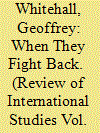| Srl | Item |
| 1 |
ID:
087998


|
|
|
|
|
| Publication |
2009.
|
| Summary/Abstract |
This paper details one attempt to construct an introductory course in international relations and comparative politics that does not rely upon one of the many textbooks in the field. This course description seeks to introduce students to global issues without reproducing and reifying a particular way of being in the world. It achieves this curatorial effect by exploring 11 concepts in the context of 11 books. There are both significant advantages and disadvantages to this approach. While the course is a lot more work for everyone, risks privileging breadth over depth, the results of this pedagogical method are opinioned to be remarkable and rewarding for both the student and the professor.
|
|
|
|
|
|
|
|
|
|
|
|
|
|
|
|
| 2 |
ID:
193309


|
|
|
|
|
| Summary/Abstract |
Since humanity is no longer the epistemological, ontological, or moral measure of all things, then (how) should international political theorists rethink animal politics? The archive ‘When They Fight Back’ records incidences of when animals ‘fought back’. It explores ways of conceptualising resistance and the implications of broadening the concept to include non-human actors via three findings: (1) Animal conflicts are everywhere and classifying them as revolt, reaction, and resistance is a creative exercise that encourages reflections about interspecies relations; (2) Most animal/human conflicts are not treated as ‘conflicts’. Instead, they are normalised within a biopolitical discourse that seeks to reduce resistance (characterised as Animal living) in order to promote living (characterised as Human resistance). (3) If excluded, animal resistance finds its way back into literatures via ethical-aesthetic figurations, traces, and desires ‘for’ the Animal. As such, the archive stages a Clausewitzian case of escalation from resistances into total war. In open hostility towards a perceived enemy, animals fight back – and because they fight back, humanism has built its own form of resistance (i.e., politics, ethics, aesthetics, biopolitics, international relations, etc.). I conclude that Human Being (as a form of resistance) must be surrendered if the war on life itself is to end.
|
|
|
|
|
|
|
|
|
|
|
|
|
|
|
|